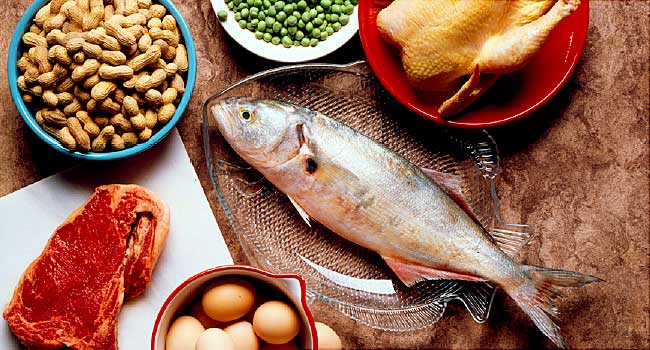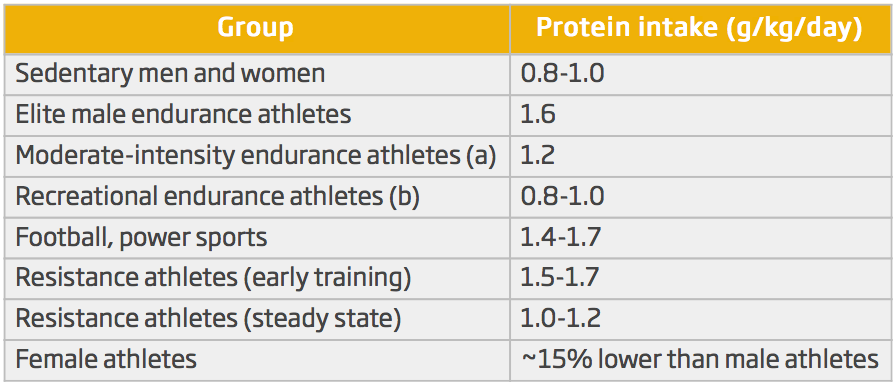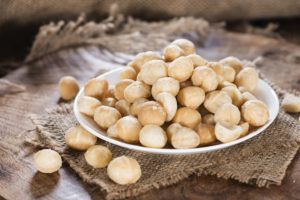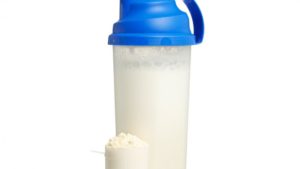 Protein has been a popular topic of conversation amongst gym goers and dieters for quite some time now. In fact it’s not uncommon that we have new clients come to us who haven’t started exercising yet but have already been sold numerous protein and amino acid powders by the local supplement store to help them lose weight or gain muscle. Of course figuring out the truth from the (often lucrative) lies can be really challenging! So what does the science suggest? And how does that relate to real life protein requirements?
Protein has been a popular topic of conversation amongst gym goers and dieters for quite some time now. In fact it’s not uncommon that we have new clients come to us who haven’t started exercising yet but have already been sold numerous protein and amino acid powders by the local supplement store to help them lose weight or gain muscle. Of course figuring out the truth from the (often lucrative) lies can be really challenging! So what does the science suggest? And how does that relate to real life protein requirements?How much protein do I need?

So does the recommended intake apply to me?
Meaning that whilst 0.8g/kg will keep most people ticking over, it won’t necessarily have you firing on all cylinders or recovering well from exercise or illness.

When to boost your protein intake
-
- Exercise. Protein is important for muscle growth, repair and recovery, and it’s not just for body builders. So if you’re exercising regularly or intensely, or you’re lifting weights, your overall protein requirement is going to go up. Heads up if you’re a long distance runner, cyclist or swimmer – protein is also important for maintaining muscle and lean weight in endurance athletes. 1,2,17,18
-
- Weight loss. Consuming more protein has been shown to help with weight loss. One of the reasons for that is the power of protein to make you feel fuller, and for longer (protein is the most satiating of all the macronutrients) – meaning you eat less overall.7,9,10,12,13,14
-
- Weight management. After weight loss, studies have shown that it may be easier to maintain your weight loss by following a higher protein diet. A 2-year study looking at people on diets made up of different ratios of macronutrients (standard protein vs high protein vs high fat vs high carb etc) found that adherence to the high fat and protein diets were associated with more weight loss, and that women on the high carbohydrate diet regained significantly more weight compared to the low carbohydrate diet between 6-24 months. 10,11,12
-
- Metabolic syndrome and chronic illness including obesity. Some research suggests that a diet focusing on increasing protein and lowering carbohydrate intake can not only improve fat loss, but also metabolic markers such as triglycerides and total cholesterol. 5,9,10,12,13
-
- Illness, injury and even stress. During periods of illness, injury and stress, protein requirements increase to support the normal functioning of the body and the recovery of affected tissues. Additionally, stress and illness can lead to reduced food intake overall, and stress, illness and injury often lead to periods of sedentary behaviour and less physical activity. Supplementing with additional protein has been found to help maintain muscle mass during periods of muscle disuse.15,16
- Age. Due to changes in metabolism, physical activity, eating habits and overall caloric intake, plus more bouts of illness, “for any diet in which protein intake is likely to be limiting, sedentary elderly people are the population group most at risk from protein deficiency”2

How much extra protein?
Well that depends on your objective. Overall there are so many variables in each individual person (genetics, gender, age, physical activity type and level, metabolic profile, diet and digestibility factors…) that there is no simple formula that will tell you exactly how much you need. In fact throughout your lifetime your protein requirements will change regularly. However, using the information above we can get an idea of when it seems reasonable to boost protein intake.
Weight loss
When it comes to weight loss, a review in Nutrition & Metabolism states that:
“providing a sufficient deviation from habitual intake appears to be an important factor…
A modest increase in dietary protein favourably effects body composition during weight management interventions.” 7
Researchers have named two theories for a common trend in the data so far – protein spread theory and protein change theory.
From the research it seems there needs to be a good spread or difference between the amount of protein in two trial groups, or a reasonable jump in protein intake, before we see positive results.
What they’re getting at is that protein intake has to moderately (not just mildly) increase to see benefits in a weight loss diet.
For example, one study compared participants consuming 1.71 g/kg/day protein to a control group consuming 1.29g/kg/day. The high protein group gained back 1 kg less weight and lost 2.2 kg more fat compared to a control group over a 13 week period 8. So eating one more prawn at dinner isn’t likely to change your results, but focusing on including more high protein foods in your diet every day or taking a protein supplement may be enough to see a benefit.
Exercise
If you’re exercising or training regularly, increasing your protein intake may help your muscles grow, adapt and recover whilst allowing you to maintain your lean mass even if you lose fat mass.
The following table is from the Australian Institute of Sport website and has been taken from “Clinical Sports Nutrition” by Deakin and Burke:

Looking at these guidelines, its safe to say that if you’re in the gym or hitting the road a few times per week your protein requirements are going to be higher than people who aren’t exercising.
And if you’ve recently started resistance training or increased the intensity of that training, or you engage in “power sports,” it is recommended that you consume up to twice the recommended daily intake for the average person.
So how do I get enough protein?
It is favourable to source nutrients from real food whenever possible – this is how we are designed to receive our protein intake and we then receive the benefits of other nutrients found in those foods.
Having said that, there are times when eating enough protein gets tough. Perhaps you’re a Crossfit athlete or powerlifter and the thought of another chicken breast is getting too much, or you’re on a restricted diet and you can’t have eggs or dairy, or you’re allergic to seafood, you’re a vegetarian, maybe you’re struggling to cook good meals regularly due to your work schedule…
Considering those things, here are some suggestions:
If your diet is currently a standard western, high-carb, processed food diet then speaking to a nutritionist or naturopath to improve your general knowledge and diet overall is a great first step.
If you’re already eating a mostly real food diet with plenty of vegetables, some fruit, meats, fish and other seafood, eggs, maybe some dairy, some nuts and seeds, then it may be a case of looking for ways to include more servings of the protein-rich foods. This could mean ensuring you have some protein like eggs at breakfast if you’re not already, or aiming for 2 of your main meals per day to feature a good bit of protein – say chicken at lunch and fish at dinner.

Another idea is to snack on high protein foods. One study looked at type-2 diabetes patients and the inclusion of specific low-glycemic, moderately high-protein products in breakfast, morning and afternoon snacks. This study found that adding in these protein snacks seemed to promote body weight and fat-mass loss. 6
A high protein snack could be some cold meats, a tin of sardines or other seafood, cheese or yoghurt, nuts, hard-boiled eggs etc.
Side note: Keep in mind that most foods contain some protein, but that some foods contain more than others; not all foods contain all of the essential amino acids required by the human body (the building blocks of proteins); and not all foods are as readily digestible as others, meaning if we test the food for protein levels and then test the human after eating the food, not all the protein made it in! Overall, animal products provide us with the most quality protein when we account for all of these factors.

Lastly you can consider a protein powder. These can be a valid way of supplementing your diet with additional protein for any of the above purposes of weight loss, weight maintenance, muscle gain or recovery, ensuring adequate intake on a restricted or vegetarian diet or recovering from serious illness. 18
Look for a protein powder that is a pure blend of only what you need and avoid sugars and other additives. Whey protein is the classic protein powder and is highly bioavailable, pea and rice proteins are an option for vegetarian diets, and for those who experience intolerance to whey powders (dairy proteins) there are also hydrolysed beef proteins available.
Want weekly inspiration sent right to your inbox?
We’re talking recipes, fitness tips, workouts, yoga sequences, plus the latest in health and wellness, sign up to our newsletter here.
Kelly Moriarty BVSc, Cert IV fitness, Dip Adult Nutrition
-
- Burke and Deakin, Clinical Sports Nutrition, 3rd Edition, McGraw-Hill Australia Pty Ltd, 2006
- “Protein and Amino Acid Requirements in Human Nutrition” Report of a joint FAO/WHO/UNU expert consultation (WHO Technical Report Series 935), World Health Organization, Food and Agriculture Organization of the United Nations, United Nations University, 2007
- “A high-protein diet induces sustained reductions in appetite, ad libitum caloric intake, and body weight despite compensatory changes in diurnal plasma leptin and gherkin concentrations” Weigle et al, Am J Clin Nutr July 2005
- “Effects of energy-restricted high-protein, low-fat compared with standard-protein, low-fat diets: a meta-analysis of randomized controlled trials.” Wycherley TP et al, Am J Clin Nutr. 2012 Dec;96(6):1281-98. doi: 10.3945/ajcn.112.044321. Epub 2012 Oct 24.
- “High protein diets decrease total and abdominal fat and improve CVD risk profile in overweight and obese men and women with elevated triacylglycerol.”Clifton PM et al, Nutr Metab Cardiovasc Dis. 2009 Oct;19(8):548-54. doi: 10.1016/j.numecd.2008.10.006. Epub 2009 Jan 29.
- “Chronologically scheduled snacking with high-protein products within the habitual diet in type-2 diabetes patients leads to a fat mass loss: a longitudinal study.”, Navas-Carretero S et al, Nutr J. 2011 Jul 14;10:74. doi: 10.1186/1475-2891-10-74.
- “Dietary protein in weight management: a review proposing protein spread and change theories”, Bosse, Dixon, Nutrition & Metabolism. 2012 9:81 https://doi.org/10.1186/1743-7075-9-81
- “High protein intake sustains weight maintenance after body weight loss in humans.” Westerterp-Plantenga, M. S., et al. International journal of obesity 28.1 (2004): 57.
- “Effect of a high-protein, high-monounsaturated fat weight loss diet on glycemic control and lipid levels in type 2 diabetes.” Parker B et al, Diabetes Care. 2002 Mar;25(3):425-30.
- “Metabolic Advantages of Higher Protein Diets and Benefits of Dairy Foods on Weight Management, Glycemic Regulation, and Bone.” Pasiakos, S. M. (2015), Journal of Food Science, 80: A2–A7. doi: 10.1111/1750-3841.12804
- “The effect of a low-fat, high-protein or high-carbohydrate ad libitum diet on weight loss maintenance and metabolic risk factors.”Claessens M etc al, Int J Obes (Lond). 2009 Mar;33(3):296-304. doi: 10.1038/ijo.2008.278. Epub 2009 Jan 20.
- “The significance of protein in food intake and body weight regulation.”Westerterp-Plantenga MS1., Curr Opin Clin Nutr Metab Care. 2003 Nov;6(6):635-8.
- “Benefits of high-protein weight loss diets: enough evidence for practice?”Brehm BJ1, D’Alessio DA., Curr Opin Endocrinol Diabetes Obes. 2008 Oct;15(5):416-21. doi: 10.1097/MED.0b013e328308dc13.
- “The effects of high protein diets on thermogenesis, satiety and weight loss: a critical review.” Halton TL1, Hu FB., J Am Coll Nutr. 2004 Oct;23(5):373-85.
- “Nutritional strategies to attenuate muscle disuse atrophy.”Wall BT1, van Loon LJ., Nutr Rev. 2013 Apr;71(4):195-208. doi: 10.1111/nure.12019. Epub 2013 Feb 28.
- “Stress and nutrition.”, Kipp D., ASDC J Dent Child. 1985 Jan-Feb;52(1):68-71.
- “Considerations for protein intake in managing weight loss in athletes.” Murphy CH1, Hector AJ, Phillips SM., Eur J Sport Sci. 2015;15(1):21-8. doi: 10.1080/17461391.2014.936325. Epub 2014 Jul 11.
- “International Society of Sports Nutrition Position Stand: protein and exercise.” Jager R et al, J Int Soc Sports Nutr. 2017 Jun 20;14:20. doi: 10.1186/s12970-017-0177-8. eCollection 2017.
